New chaplain position helps SOM students develop holistic care approach
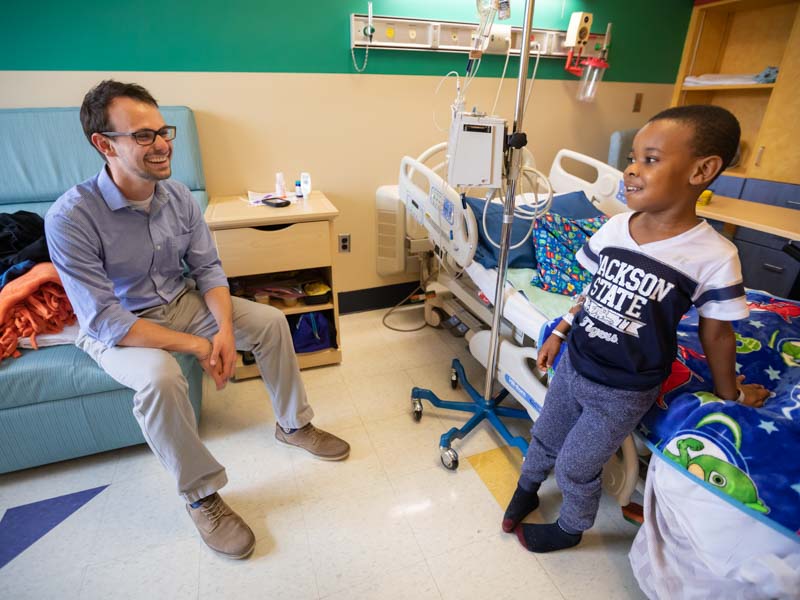
When Rev. Doris Whitaker, director of pastoral services at the University of Mississippi Medical Center first met then-Associated Student Body President Edgar Meyer, she remembers being a bit overwhelmed by his countless ideas and plans. One of them was to create a student chaplain position and train future health care providers in spiritual ministry of terminally ill and struggling patients.
Despite her initial hesitancy, Meyer, a devoted Catholic involved in the Catholic Student Association and in the local Catholic community, came through for Whitaker in a big way. Whitaker asked Meyer if he could help her get a priest to hold mass regularly in the hospital’s chapel.
Meyer, with the help of the Catholic Student Association, contacted Father John Bohn who now administers mass in the chapel every Thursday.
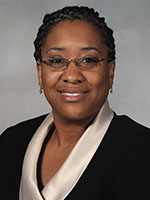
“He’s calmly persistent. He’s really a gentle soul, but he knows how to get things done,” Whitaker said of Meyer. After that, the two became “fast friends.”
She became more open to Meyer’s idea, which came to him after he was asked to visit the wife of a patient in intensive care two years ago.
Meyer was trained to be a Eucharistic minister, to bring communion to hospitalized and homebound and was used to interacting with patients in that capacity, but not to listening to and communicating with them and their families.
The woman, whose husband had received a liver transplant that his body was rejecting, became very emotional, and all Meyer could think to do was listen, then take her hands and pray.
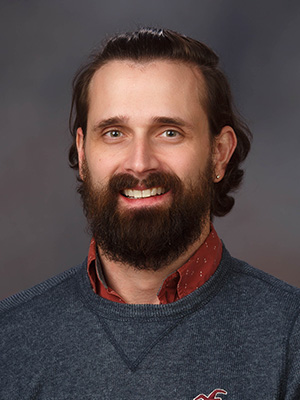
“After that experience… I went to my office and closed the door and just broke down because it was one of those experiences where someone shares this really intimate information with you, and you don’t feel worthy of being a part of that kind of encounter,” he described.
At that time, he realized there are issues future health care providers may have to deal with but aren’t being taught how in school.
“We needed something for students to have a similar experience to health care professionals who are involved with palliative and end of life care,” explained Meyer.
Whitaker agreed that she and the two other hospital chaplains would help and began getting together training materials. Meyer created an application process, which both Alex Rueff and Richelle Jefferson, fourth-year medical students at the time, completed.
“Training students in such a meaningful role can teach them the importance of considering a patient from a holistic approach – mind, body and soul,” said Meyer. “By truly understanding the patient’s spirituality or non-spirituality, health care professionals and trainees can better offer more wholesome care.”
Meyer also thought it would be a good idea for student chaplains to be equipped with these skills for their fellow medical students. According to one study, almost 50 percent of the students in the study experienced burnout, and about 11 percent reported suicidal ideation in the past year.
The program is not being done at any other medical school in the same way, according to Meyer.
Rueff and Jefferson attended five training sessions with Whitaker and other chaplains where they learned about topics such as ethics and confidentiality, protocol for grieving, active listening and how to make a chaplain referral, among others.
Rueff, who is also Catholic, said he was eager to get involved because he is firm in his own faith but he is interested in learning about others.
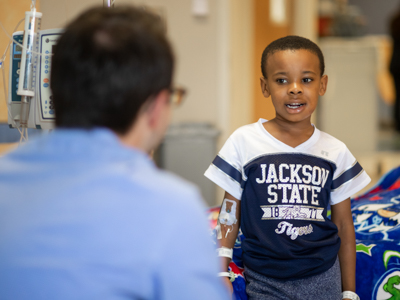
When he visits 7-year-old Princeton Donelson who was hospitalized for a tooth abscess, and they play with the toy kitchen set together in the activity room, Rueff’s natural affinity for children is obvious.
“I guess what it boils down to is I find it easy to interact with kids, their honesty… Usually they’re content in life which is absolutely touching,” he said. “I couldn’t imagine not having the opportunity to work with kids.”
He said the experience of becoming a student chaplain will undoubtedly help him in his career as a pediatrician. He will begin his residency in pediatrics at UMMC in June.
“The biggest benefit of this role has been learning to have a conversation with a patient without attempting to fix their problems, which is a really difficult conversation for a doctor to have because we’re so used to having fixes expected of us,” he said. “… that was really the biggest thing for me in this role was learning how to communicate with patients and how to help them when you can’t fix their problems.”
Rueff also visited with adults during his time as a student chaplain, and one visit in particular stands out. He spent hours with a patient who had a terminal illness and died a week later. Rueff mostly listened to him, which was exactly what he needed at the time.
“What really blows my mind is how open people are, and it really doesn’t even matter what background they come from. When you introduce yourself as a chaplain and say I’m here to meet your needs, they open up on profound levels,” he described.
This patient in particular wanted to talk about his passion and how he used it do good things in the world: biking.
“He shared a little bit about his faith with me but talked mostly about how he really enjoyed biking – it was his hobby and his passion in life and he used that to do a lot of charitable work. It was just really moving to hear what he was able to do in his lifetime … in that moment, he seemed happy” with what he’d accomplished, he said.
Of course, not all patients facing the end of their lives want to open up or have such a positive outlook. At that time, student chaplains are encouraged to use the ministry of presence – or, if a patient prefers to be alone, the ministry of absence, which involves thinking and praying for the person while giving them physical space.
“It makes me grow more deeply in my own faith because you learn so many things, talk to so many people and learn about their experiences. You can’t help but to grow spiritually,” he said.
Jefferson’s interest was first sparked as a third-year medical student on rotation at the Veterans Administration. She had a patient who was experiencing a lot of anxiety due to delays in medical testing and issues at home.
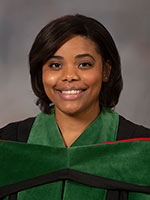
“As a third-year medical student, you don’t know what your role is. There are a lot of ways you cannot really help because you’re trying to learn yourself, your role and always be appropriate,” Jefferson said.
She would go and visit the patient each morning in his room, and eventually an opportunity presented itself.
“I ended up being able to have a whole conversation about spirituality and having the opportunity to pray together … we’d reached an impasse for him as far as what we were able to do at that time at the hospital, but he ended up having this time of encouragement I was able to talk to him in a different context,” she described.
That experience, and the training she received from the chaplains, “made me feel a lot more comfortable” with talking to patients and how to handle their difficult, and sometimes impossible, problems.
“I learned how to do it in an appropriate way in a medical context,” she said, noting she will carry those skills with her to her residency in family medicine at the University of South Alabama.


